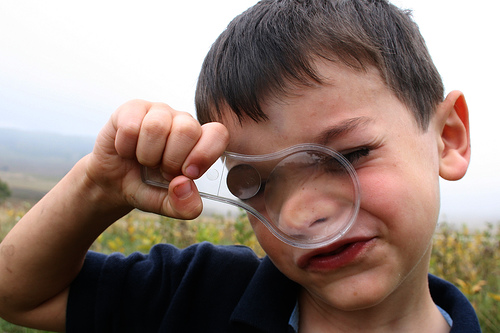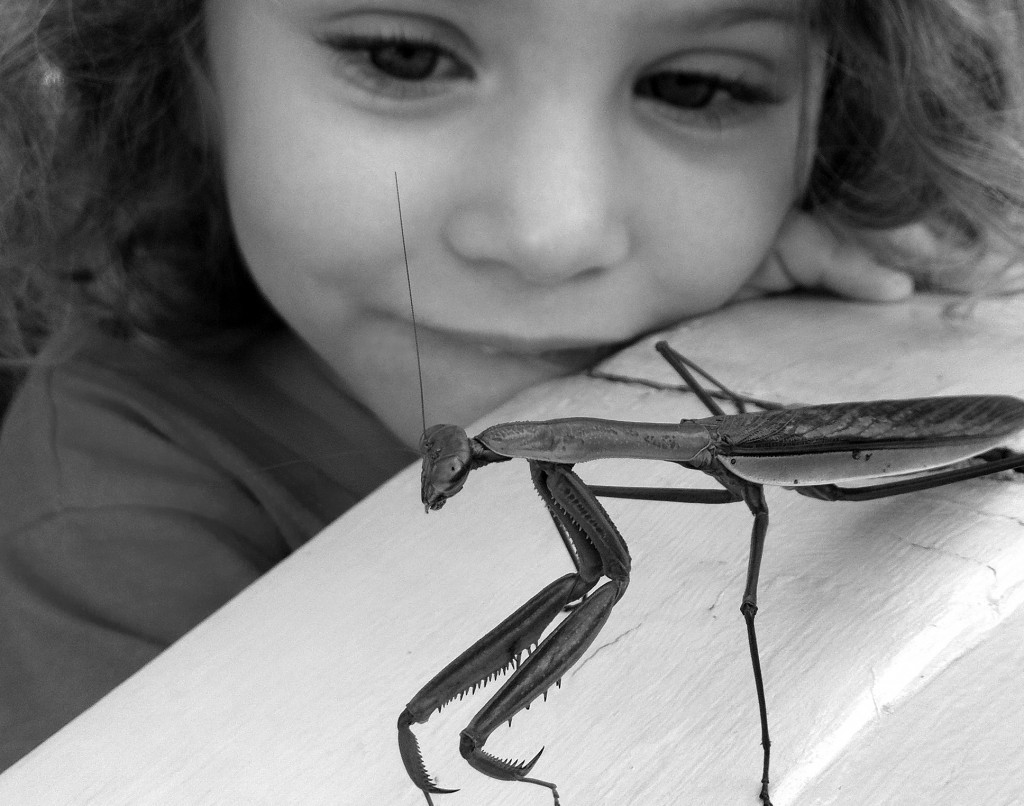How do you express that which you do not know? Is it really as simple as it sounds? How do you recognize uncomfortable uncertainty? Can you articulate the degree and type of not-knowing that can lead to wonderment? Is this quantifiable in some way? Would this even be valuable? If so, it would likely lead to new jargon. Might that be a good or bad thing? Before coming back to these initial questions, let’s first briefly examine jargon itself.

jargon 1 |ˈjärgən| noun special words or expressions that are used by a particular profession or group and are difficult for others to understand
How do you feel about jargon in general? More specifically, what about edu-jargon? Ever hear someone use “nickle-bee” in reference to the Elementary and Secondary Education Act (NCLB)? I have. Personally, I know how I felt about edu-jargon as recently as six years ago. Put simply, I was largely offended by it. As a full-time classroom teacher for many years, my professional reality was wrapped up almost entirely within the four walls of my classroom. The bulk of my interactions on a daily basis were spelled out with my students, and to a lesser extent their parents. This is not to say that I didn’t enjoy some truly model collaboration with a few colleagues. Are you ears burning, Jincy? The bottom line: edu-speak in that scenario would have actually been a barrier to understanding among all stakeholders. See what I did there?
And yet, this post is not a blanket denouncement of jargon as a whole. In fact, my acceptance of edu-jargon began about the time I made the switch from a full-time classroom teacher to the role of instructional coach in my building. In that role, after teaching Dual-Credit Biology or Zoology first block, I would spend the remainder of my day in direct support of teachers. Whether it was whole faculty PD, small group studies or one-to-one coaching, my work for the first time was outside those four secure classroom walls. As a generalist coach in a high school, instructional practice was a common strand that could be studied across content areas (smart folks would make an argument here for technology as well). It was at that point that I had to quickly warm to the jargon that would allow a back and forth regarding the practices of teaching and learning. (I could have said pedagogy here if I wanted, and I usually do… work with me.)
To say that I grew as a professional during those four years would be a criminal understatement. Thoughtful sessions punctuated by planning, discourse, and debate were the norm. When learning alongside my fellow coaches each week during our own PD sessions, we simply had to bat jargon back and forth to be even remotely efficient and uniform at conveying the work we were doing. As I reflect back, a challenge there was in not stoking the fire and brewing a cauldron of our own comfy jargon that would be off-putting to our wider faculty back in schools. Tracy Staedter’s recent interview with Jonathon Keats reminds me of this fine line between positive and negative. In response to her question, “Why does jargon exist at all?”, Keats replied with:
“Jargon is usually counterproductive in the long term, but in the short term, it’s so useful as to be seductive. It becomes a code that establishes membership in a given guild and allows abbreviated communication in that guild, and prevents someone who is not in that guild from understanding anything. In the long term, it’s catastrophic though, because it prevents anything new from happening. Assumptions get forgotten, and innovation is inhibited. You get communication onto a plateau where everyone agrees, but nobody ever asks any questions about whether there might be some flaw in the worldview as a whole.”
You must know that Keats, an experimental philosopher, is one rather unique individual. When further discussing if and when jargon becomes not jargon, he goes on to assert that words arising from marketing and self-promotion have little chance of becoming anything else. He suggests that the only way jargon rises up into something more universally-accepted is that if it does so organically. He claims that only the natural language that arises from the origin of a true and credible subculture has a chance of making it.

Metacognition
To me, the conversation there wound down just when it got interesting. Keats was then asked if there might be a noun or verb in science that doesn’t currently exist, but should. Though he hesitated to suggest a particular term, he spoke of the need for a term describing the realm of not-knowing. Smart educators have long been aware that one of the keys to deep understanding is metacognition. Today we should well know that keeping abreast of one’s own thought processes throughout the course of learning is a crucial element to success. In fact, a purposeful approach to formative assessment pretty much rests its core on attention to metacognition. Or rather, it should, in my opinion.
Foundational to the subject is Stanford Psychologist, John Flavell. Flavell differentiated between metacognitive knowledge and metacognitive regulation. Metacognitive knowledge can be as simple as knowing that the Biology textbook you just pulled out of your backpack will require a completely different approach than the novel in the next pocket. Regulation of metacognition is where the payoffs begin. These are the often subtle self-questioning strategies of comprehension. — What did that just say? Were you able to connect the previous few sentences to another event? Did you feel the need at some point to go back and re-read? Might you have even looked up a word or concept in a completely outside source for further understanding? That set of actions might just be the distilled essence of regulation of metacognition.
To ditch the jargon… did I “get it,” or not, and what am I going to do about it?

Not-Knowing
It might seem that the concept of metacognition is fairly easily summed up in that one fancy word. Inherent in regulation would be not only knowing, but the ability to detect not-knowing. Right? Keats would suggest “not so fast” on this one. In the interview, the man who copyrighted his very brain, asserts that not only is the act of deeply not-knowing the underlying impetus of science, but that we might not hear much of this today. The reason? Perhaps because today we are so proud of being “in an information age.” Wary of outright suggesting a term or terms for not-knowing, he encourages people to widely discuss and debate the idea, thereby organically breeding words to describe what he sees as a potentially valuable addition to our language.
From my perspective, there’s truly something to this discussion. I can’t quite nail it comfortably in my head and that is what tells me this likely is a worthy debate. I can honestly say that in my years as a biology teacher, the parameters of certainty were something we got a great deal of mileage from. Though most of what I remember was instead an explicitly cognitive strategy… identifying, analyzing, and stating upfront the limits of certainty in experimental data. I always felt that a keen focus in that area was one of the things responsible for the success of so many of my students. That depth of… not understanding at the edges of what they had discovered was the impetus for the wonderment and awe that often led to some pretty remarkable things. Yet, as a meta-process, I’m just not sure. Do we truly need an inverse of knowing?
What do you think of this? After thinking this through a bit, are you able to make room for a bit of verbiage in this realm? I figure I might as well do my part to kick some rather important jargon around and see if we can’t elevate the discourse in one small corner of cyberspace.
Artwork
*A Curious Discovery 2 by Liam Manic on Flickr. *not quite clear on the concept by woodleywonderworks on Flickr. *Delaney and the Mantis is one I captured this past Autumn. .
Dear Sean,
This one’s going to take me a bit to digest, and I will. Lots of wonderful stuff in the post, the kind of stuff I love talking about (but often clears the room).
In the meantime, I don’t know if you noticed, but a huge child-eating mama Stagmomantis is about to chomp the head off your lovely child.
Just sayin’….
Yep- I just chased Jaime (@DrDial) out of the room with this very conversation. Notice how her comment below here is on the jargon aspect of the story as opposed to the real room-evacuating stuff. I’ll eventually win her back.
Also, I’m happy to say that Delaney emerged unscathed from that encounter. She just kept laughing and how “funny his head” was, and how “he’s looking at me,” “I think he knows I’m staring at him.” Yes, dear… if you were a wee bit smaller, he’d eat you.
Sean,
Like MIchael, I too am going to have to mull this one around in my brain. It’s very interesting, this thought of not knowing. It makes me think of the possibilities of asking ourselves (and our students) on a regular basis, “What do I now realize I don not know based on this new learning?” Seems an idea for a stepping stone to the forward movement of next steps in the learning process.
A wonderful post, and one that will leave me thinking for quite some time. You never cease to amaze me.
You’re right, even that one takeaway alone (“What do I now realize I don not know based on this new learning?”) is enough to inject a pretty serious shot of depth into the “next steps” at any level of the learning process.
Our society is filled with jargon–not just edu-jargon. Are educators some of the worst at using terms that other non-educators don’t understand? Sure. However, when was the last time you went to see your doctor, only to have him talk to you like you were one of his colleagues rather than a patient? This has happened to me on occasion, and I can completely empathize with how frustrating it is to not understand.
With that said, I think it is human nature to want to be seen as “the smartest kid in the class.” The Keats quote you have in your post says quite a lot about us as humans. I believe we sometimes relish in being the person who understands while others sit in wonderment (or frustration). This isn’t because we are malicious in nature (at least most of the time), but because we want to be the best.
Is this thinking off?
Some deep stuff that takes me back to my religious upbringing. I was raised in a very conservative Christian church and school. We had all of the answers and if anyone disagreed they were wrong. I remember a young pastor of my church who was not ordained because he was not able to clearly define the role of women in the church. Instead he honestly admitted he did not have it all figured out yet.
One of the most powerful lessons of my early adulthood was learning and exploring the flaws of my viewpoints. I have not rejected all of my upbringing but now have a much humbler feeling about what I “know.” I think this affects my attitude toward all learning now. I am much more open to other viewpoints because I recognize my knowledge is always flawed and biased.
I don’t know if we need a word for this (I hate jargon) but I think it is an important way of thinking that many Americans (let alone students) lack.